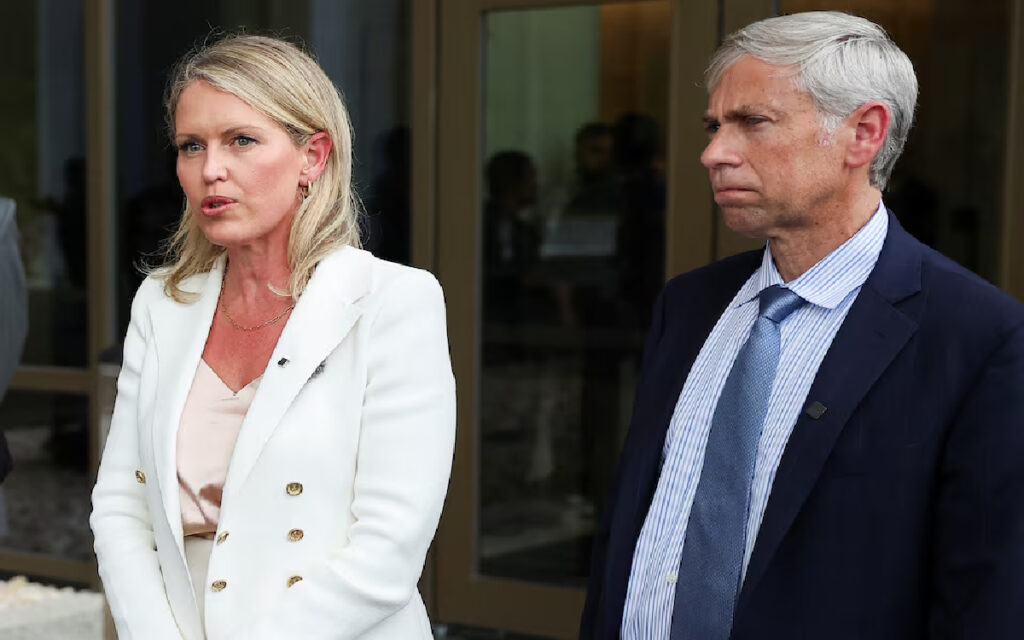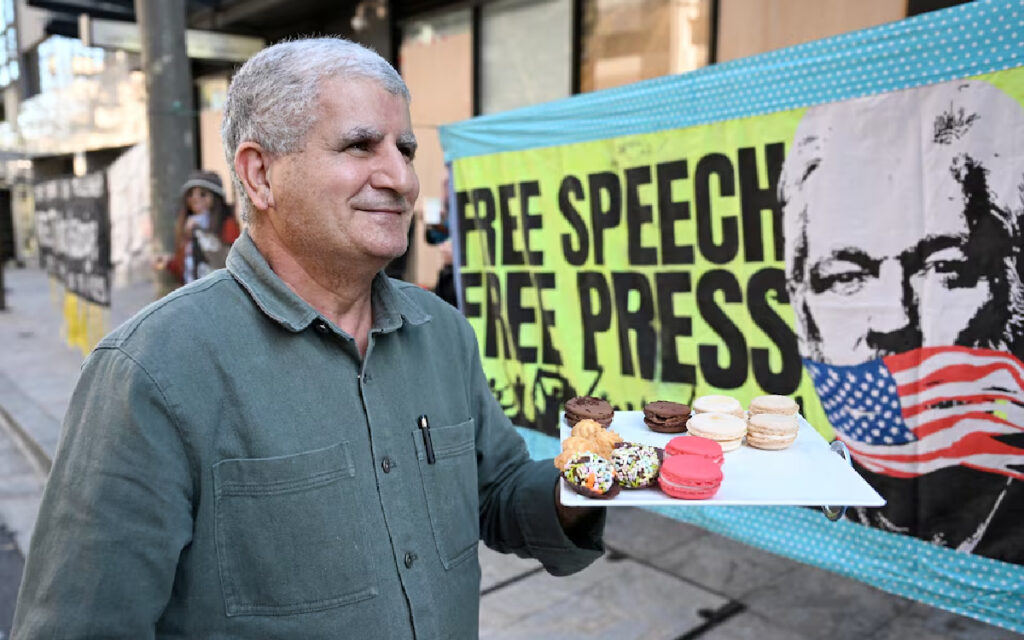New York: Julian Assange, the founder of WikiLeaks, was released by a court on the remote U.S. Pacific territory of Saipan on Wednesday, ending a 14-year legal battle that has drawn significant global attention. Assange, who had spent five years in a high-security British prison and seven years seeking asylum in the Ecuadorean embassy in London, walked free, thanks to the tireless diplomatic efforts spearheaded by Australian Prime Minister Anthony Albanese.

Jennifer Robinson, Assange’s Australian attorney, highlighted the crucial role of diplomacy and lobbying at the highest levels in the U.S. “At every opportunity, and when Australian officials were making outreach to the U.S., they knew that they were acting with the full authority of the prime minister of Australia,” Robinson told reporters outside the courtroom in Saipan. Her statement underscored the importance of the direct involvement and unwavering support from Albanese and his government.
Albanese, leading Australia’s center-left Labor government, claimed Assange’s release as a significant achievement for the country. He emphasized that Australia’s security ties with Washington and London were leveraged to strengthen their case, ultimately leading to the resolution of Assange’s plight. “This work has been complex and it has been considered. This is what standing up for Australians around the world looks like,” Albanese proudly declared in parliament on Wednesday.
Assange, who was due to arrive in Australia on Wednesday evening, had initially faced a daunting legal scenario. He was charged with 17 counts of breaching the U.S. Espionage Act and an additional hacking-related charge, which collectively could have resulted in a maximum jail sentence of 175 years. However, under a deal revealed on Tuesday, Assange pled guilty to a single charge of espionage, which allowed him to secure his release.
The diplomatic negotiations gained momentum as the U.S. faced increasing legal challenges in the UK regarding the legality of Assange’s extradition. Concurrently, Australian lawmakers and diplomats intensified their lobbying efforts in Washington and London, pushing for a resolution.

A significant shift occurred in Australia’s political landscape a decade ago. Under a conservative government, there was minimal political will in Canberra to back Assange’s case. However, in 2023, a substantial political shift saw lawmakers across the political spectrum rallying behind the campaign to bring Assange home. His father, John Shipton, acknowledged this change during an interview with Reuters, noting the critical role played by a broad coalition of lawmakers.
This political shift culminated in February with the passage of a parliamentary motion calling for Assange’s release. Shipton praised the Australian government, describing their efforts as “nothing short of magnificent.” He also acknowledged the contributions of former prime minister Kevin Rudd and former defense minister Stephen Smith, Australia’s top envoys to the U.S. and Britain, who were instrumental in the campaign.
Among the prominent supporters was conservative lawmaker Barnaby Joyce, a former deputy prime minister, who joined a cross-party group of politicians traveling to Washington in September to lobby for a resolution. Reflecting on the trip, Joyce stated, “The trip made the case on Capitol Hill that Australian politicians wanted to ‘get this thing done’ because it was a distraction to Australia’s security alliance with the United States.”
Also Read | OpenAI to Block Users from China Amid Growing Geopolitical Tensions
Long-time advisor to the Australian campaign for Assange, lawyer Greg Barns, remarked that U.S. politicians observed during the trip that “this wasn’t a party political issue.” This bipartisan approach further strengthened the campaign’s credibility and urgency.
An unnamed government official revealed that the first significant breakthrough came in January 2021, when then shadow Attorney General Mark Dreyfus issued a statement calling for the end of the case against Assange. This followed a British court’s finding that extraditing Assange to the U.S. would be unjust. “This was the first indication that a major political party in Australia was supporting the cause to free Assange,” the official noted.
When Labor won power in May 2022, Assange finally had state diplomatic support behind him. Later that year, Albanese called for Assange’s release on the floor of the House of Representatives, marking the first time a Prime Minister had mentioned Assange in parliament since 2012. “Enough is enough, it is time for this matter to be brought to a conclusion,” he declared. “My position is clear and has been made clear to the U.S. administration that it is time that this matter be brought to a close. This is an Australian citizen.”
Behind the scenes, Albanese, along with senior cabinet colleagues including Foreign Minister Penny Wong and Attorney General Mark Dreyfus, utilized their visits to the U.S. to lobby their counterparts. The appointment of Smith and Rudd to the top diplomatic jobs in London and Washington in late 2022 added two more sympathetic lobbyists for Assange’s cause. Smith’s visit to Assange in Belmarsh prison in April 2023 marked the first such visit by Australia’s top UK diplomat since Assange’s imprisonment four years earlier.
Also Read | Julian Assange and WikiLeaks: A 14-Year Legal Saga Explained
Deeper ties between Australia and the U.S. through the AUKUS security pact further facilitated diplomatic efforts. Mark Kenny, a professor at Australian National University, remarked, “It looks pretty odd if we’re getting ever closer to the U.S. and yet we don’t have a special relationship with the U.S. such that we can advocate and get concessions for an Australian citizen.”
As recently as July, U.S. officials appeared determined to prosecute Assange. Secretary of State Antony Blinken stated that month that Australia needed to understand U.S. concerns over the issue. However, by August, U.S. Ambassador to Australia Caroline Kennedy suggested a deal was possible. Following the cross-party delegation of Australian politicians’ visit to Washington in September, the Biden administration seemed to soften its stance. President Joe Biden, when asked in April about Australia’s request to end Assange’s prosecution, responded, “We are considering it.”
The UK High Court’s decision in May to allow Assange to appeal against his extradition was a significant trigger for the breakthrough in negotiations over a plea deal. This decision meant the legal battle over extradition would likely be delayed for months, providing time for appeals.
Initially, there was a plan for Assange to fly to New York or Washington to enter his plea. However, this was changed to Saipan due to Assange’s opposition to entering the continental United States, according to an Australian government official.
Also Read | Russia and US Discuss ‘Situations Around Ukraine’ by Phone
The deal that finally secured Assange’s freedom marks the end of a long legal saga that began with WikiLeaks’ mass release of secret U.S. documents in 2010, one of the largest security breaches in U.S. military history. As Assange was moved from Belmarsh prison to London’s Stansted airport in the dead of night on Monday, secrecy was maintained to the extent that his children were not informed to prevent any leaks.
In the wake of his release, there was a global outpouring of support. A crowdfunding campaign to raise the $520,000 owed to the Australian government for Assange’s flights had already raised almost 330,000 pounds ($418,000) by Wednesday evening. Stella Assange, reflecting on this support, said, “I don’t think that would have happened if it hadn’t been for the incredible support that there has been for Julian, and which has been building over the years, which is global, which is across all sectors, all politics.”



